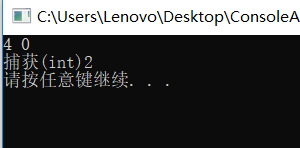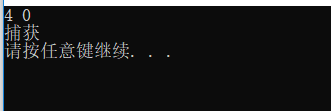一,定义
异常是程序在执行期间产生的问题,C++ 异常是指程序在运行过程中产生可预料的执行分支,如除0操作,数组访问越界、要打开的文件不存在。不同于bug,bug是指程序中的错误,是不被预期的运行方式。如野指针、堆空间使用结束未释放。
以下情况可产生异常:
- 做除法的时候除数为 0;
- 用户输入年龄时输入了一个负数;
- 用 new 运算符动态分配空间时,空间不够导致无法分配;
- 访问数组元素时,下标越界;
- 打开文件读取时,文件不存在。
二,处理异常
所谓“处理”,可以是给出错误提示信息,然后让程序沿一条不会出错的路径继续执行;也可能是不得不结束程序,但在结束前做一些必要的工作,如将内存中的数据写入文件、关闭打开的文件、释放动态分配的内存空间等。
C++ 通过 throw 语句和 try...catch 语句实现对异常的处理。throw 语句的语法如下:
throw 表达式;
该语句拋出一个异常。异常是一个表达式,其值的类型可以是基本类型,也可以是类。
try...catch 语句的语法如下:
try {
语句组
}
catch(异常类型) {
异常处理代码
}
...
catch(异常类型) {
异常处理代码
}
catch 可以有多个,但至少要有一个。
try...catch 语句的执行过程是:
- 执行 try 块中的语句,如果执行的过程中没有异常拋出,那么执行完后就执行最后一个 catch 块后面的语句,所有 catch 块中的语句都不会被执行;
- 如果 try 块执行的过程中拋出了异常,那么拋出异常后立即跳转到第一个“异常类型”和拋出的异常类型匹配的 catch 块中执行(称作异常被该 catch 块“捕获”),执行完后再跳转到最后一个 catch 块后面继续执行。
例1:
int main()
{
double m,n;
cin >> m>> n;
try
{
if (n == 0)
throw 2; //int 型
else
cout << m / n << endl;
}
catch (double d)
{
cout << "捕获(double)" << d << endl;
}
catch (int i) {
cout << "捕获(int)" << i << endl;
}
system("pause");
return 0;
}
当n为0时,抛出异常 2,被catch(int i ) 捕获。
例2:
int main()
{
double m,n;
cin >> m>> n;
try
{
if (n == 0)
throw 2.0;
else
cout << m / n << endl;
}
catch (double d)
{
cout << "捕获(double)" << d << endl;
}
catch (int i) {
cout << "捕获(int)" << i << endl;
}
system("pause");
return 0;
}
当n为0时,抛出异常 2.0,被catch(double) 捕获。
例3:
int main()
{
double m,n;
cin >> m>> n;
try
{
if (n == 0)
throw 2.0;
else
cout << m / n << endl;
}
catch (char d)
{
cout << "捕获(char)" << d << endl;
}
catch (int i) {
cout << "捕获(int)" << i << endl;
}
system("pause");
return 0;
}
当n为0时,抛出异常 2.0,与现有catch() 类型不匹配,无法捕获,程序终止。
例4:
int main()
{
double m,n;
cin >> m>> n;
try
{
if (n == 0)
throw 2.0;
else
cout << m / n << endl;
}
catch (char d)
{
cout << "捕获(char)" << d << endl;
}
catch (int i) {
cout << "捕获(int)" << i << endl;
}
catch (...) { //可捕获任何异常
cout << "捕获" << endl;
}
system("pause");
return 0;
}
catch(...) {
...
}
可捕获任何异常。
三,自定义异常
struct MyException:public exception
{
const char* what() const throw() {
return "my C++ exception";
}
};
int main()
{
double m,n;
cin >> m>> n;
try
{
if (n == 0)
throw MyException();
else
cout << m / n << endl;
}
catch (MyException& e)
{
cout << "捕获(自定义异常)" << e.what() << endl;
}
system("pause");
return 0;
}
四,C++ 标准的异常
| 异常 | 描述 |
|---|---|
| std::exception | 该异常是所有标准 C++ 异常的父类。 |
| std::bad_alloc | 该异常可以通过 new 抛出。 |
| std::bad_cast | 该异常可以通过 dynamic_cast 抛出。 |
| std::bad_exception | 这在处理 C++ 程序中无法预期的异常时非常有用。 |
| std::bad_typeid | 该异常可以通过 typeid 抛出。 |
| std::logic_error | 理论上可以通过读取代码来检测到的异常。 |
| std::domain_error | 当使用了一个无效的数学域时,会抛出该异常。 |
| std::invalid_argument | 当使用了无效的参数时,会抛出该异常。 |
| std::length_error | 当创建了太长的 std::string 时,会抛出该异常。 |
| std::out_of_range | 该异常可以通过方法抛出,例如 std::vector 和 std::bitset<>::operator[]()。 |
| std::runtime_error | 理论上不可以通过读取代码来检测到的异常。 |
| std::overflow_error | 当发生数学上溢时,会抛出该异常。 |
| std::range_error | 当尝试存储超出范围的值时,会抛出该异常。 |
| std::underflow_error | 当发生数学下溢时,会抛出该异常。 |
参考:
https://www.runoob.com/cplusplus/cpp-exceptions-handling.html























 5199
5199











 被折叠的 条评论
为什么被折叠?
被折叠的 条评论
为什么被折叠?










